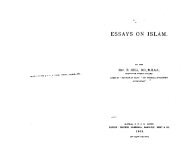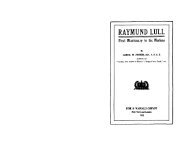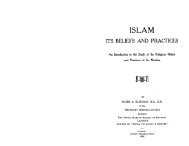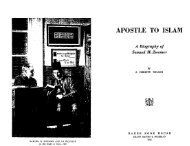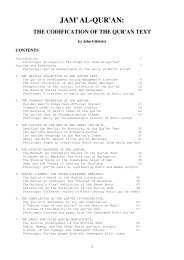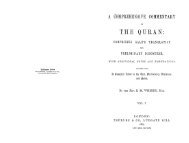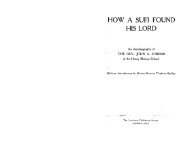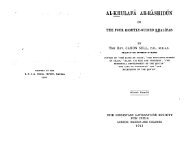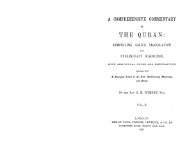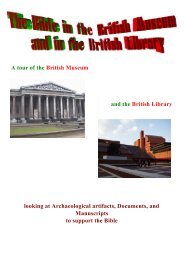Guillaume--Life of Muhammad.pdf - Radical Truth
Guillaume--Life of Muhammad.pdf - Radical Truth
Guillaume--Life of Muhammad.pdf - Radical Truth
Create successful ePaper yourself
Turn your PDF publications into a flip-book with our unique Google optimized e-Paper software.
The <strong>Life</strong> <strong>of</strong> <strong>Muhammad</strong><br />
We have an unconquerable band led by a prophet<br />
Who has brought the truth, is clement, and acclaimed as true.<br />
Can it be that the mixed tribes <strong>of</strong> Fihr have not heard<br />
Of the maiming <strong>of</strong> bodies and the splitting <strong>of</strong> skulls?<br />
647. Some authorities on poetry deny that ~Amr said this.<br />
648. This poem is the best that has been written on the subject. I:Iassan<br />
composed it at night and summoned his people, saying: '1 am afraid that<br />
death may overtake me before the morning and it may not be recited in my<br />
name.'<br />
Abu 'Ubayda quoted to me the verse <strong>of</strong> al-l;Iajjaj b. 'Ilat al-Sulami in<br />
praise <strong>of</strong> ~AII in which he mentioned his killing Tall;la b. Abu Taiba b.<br />
·Abdu'l~·Uzza,the standard-bearer <strong>of</strong> the polytheists, on the day <strong>of</strong> Ul;1ud:<br />
By God, what a fine protector <strong>of</strong> women is Fatima's son<br />
Whose paternal and maternal uncles were noble!<br />
You quickly dealt him a deadly thrust<br />
\Vhich left Tall;la with his forehead cleaving to the dust;<br />
You attacked them like a hero and made them retreat<br />
At the mountain foot, where they fell one after another.<br />
649. Most authorities on poetry deny J:Iassan's authorship. The verses<br />
'Who in the winter', 'Who leapt to their bridles', and 'By one .who suffered<br />
time's misfortunes' are no'tfrom 1.1.<br />
650. Abu Zayd quoted to me the verse IHow we behave' and the next<br />
verse and the third verse from it and the beginning <strong>of</strong> the fourth and the<br />
words 'We grow up and our fathers perish' and the next verse and the third<br />
verse from it.<br />
651, Abu Zayd quoted me the poem from the words 'Advancing ·and<br />
encouraging us" to the end.<br />
652. Abu Zayd recited it to me as from Ka'b b. Malik.<br />
653. Abu Zayd quoted me the words lyou have not won' and '<strong>of</strong> Him who<br />
grants the best favours'.<br />
654. Some authorities on poetry deny J:)irar's authorship.<br />
655. An authority on poetry told me that 'Ali did not utter these words,<br />
and I have never met anyone who recognized them as 'Ali's. They were<br />
spoken by an unknown Muslim. The phrase 'as night' has not 1.1:s<br />
authority.<br />
656. The words 'all <strong>of</strong> us' and 'they would have a morning draught' have<br />
not 1.1.'s authorirj.<br />
657. An authority on poetry quoted to me her words 'In sorrow and tears,'<br />
&c.<br />
658. An authority on poetry quoted to me her line 'Some from whom I<br />
sought vengeance,' &c. Some authorities deny that Hind uttered it, and<br />
only God knows the truth.<br />
Ibn Hishiim's Notes<br />
659. 'Ac,lal and al-Qara belonged to al-Haun or al·Hiin b. Khuzayma b.<br />
Mudrika.<br />
660. Habil means 'bereaved'.<br />
661. They sold them to Quraysh for two prisoners <strong>of</strong> Hudhayl who were<br />
in Mecca.<br />
662. al-l;Iarith b. 'Amir was the maternal uncle <strong>of</strong> Abu Ihab. The latter<br />
was one <strong>of</strong> B. Usayd b. 'Amr b. Tamimj others say one <strong>of</strong> B. 'Udas b. Zayd<br />
b. 'Abdullah b. Darim <strong>of</strong> B. Tamim.<br />
663. It is said that the youngster was her son.<br />
664. Khubayb remained imprisoned until the sacred months had passed<br />
and then they killed him.<br />
665. al-aladd means one who makes mischief with violent OpposItIon,<br />
pluralludd, as in God's book: 'that you may warn thereby a contumacious<br />
people' (19. 97). Al-Muhalhil b. Rab;'a al-Taghlibi whose name was<br />
Imru'ul-Qays {others say 'Adiy b. Rabi'a [So shows conclusively that it was<br />
'Adiy] said:<br />
Beneath the stones lies one a menace to his enemies, a boon to his friends,<br />
A doughty adversary, great in argument.<br />
Others report 'with an argument that silences his opponents'.<br />
mighlaq here means alandad as in the line <strong>of</strong> al.Tirimma1;l. b.l;Iakim describing<br />
the chameleon:<br />
He looks down on tree stumps as though<br />
He were an adversary who had overcome his contumacious rivals.<br />
[DEwan, ed. Krenkow, 141,1. 16.]<br />
666. Yashri nafsahu means 'selling himself'. Sharau means 'they sold'.<br />
Yazid b. Rabi'a b. Mufarrigh al-I:Iimyari said:<br />
Hurd was a slave whom he sold.<br />
poet's words:<br />
And I sold Burd. Would that I had died<br />
Before I sold him.<br />
Shard also means lhe bought', as in the<br />
I said.to her, Grieve not, Umm Malik, over your sons<br />
Though a mean fellow has bought them.<br />
667. Some authorities on poetry deny his authorship.<br />
668. For rufaq there is a variant furuq. We have omitted the rest <strong>of</strong> the poem<br />
because he used obscene language.<br />
669. This poem resembles the preceding. Some authorities on poetry deny<br />
that Bassan composed it. I have omitted some words <strong>of</strong> I;1assan about the<br />
affair <strong>of</strong> Khubayb for reasons I have given.<br />
670. Anas was al-Ajamm al-Sulami, maternal uncle <strong>of</strong> Mu\'im b. 'Adiy<br />
b. Naufal b. 'Abdu Manaf. When he says "Udas expelled' he means



